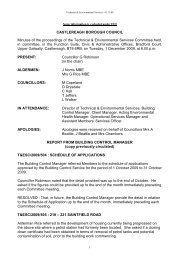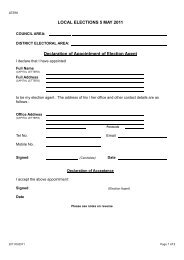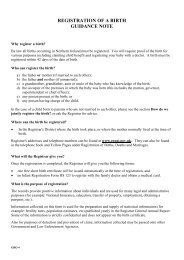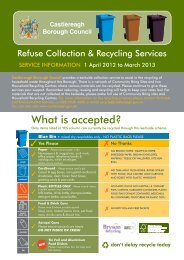code of conduct for local government employees - Castlereagh ...
code of conduct for local government employees - Castlereagh ...
code of conduct for local government employees - Castlereagh ...
Create successful ePaper yourself
Turn your PDF publications into a flip-book with our unique Google optimized e-Paper software.
THE LOCAL GOVERNMENT STAFF COMMISSION FOR NORTHERN IRELANDCODE OF CONDUCT FORLOCAL GOVERNMENT EMPLOYEESFEBRUARY 2004
CODE OF CONDUCT FOR LOCAL GOVERNMENT OFFICERSCONTENTSPage No.INTRODUCTIONStatus <strong>of</strong> the CodeFRAMEWORK FOR THE CODENational AgreementSeven Principles <strong>of</strong> Public LifeCONSULTATION AND IMPLEMENTATIONiiiiiiiiMODEL CODE OF CONDUCT FORLOCAL GOVERNMENT EMPLOYEES 1Standards <strong>of</strong> Behaviour, Impartialityand Conflicts <strong>of</strong> Interest 1Disclosure <strong>of</strong> In<strong>for</strong>mation 1Political Neutrality 2Potential Conflict <strong>of</strong> Interest Situations 2Appointments and Other Employment Matters 3Outside Commitments 3Personal Interests 4Equality Issues 4Separation <strong>of</strong> Roles During Tendering 5Corruption 5Use <strong>of</strong> Financial Resources 5Hospitality and Gifts 5Sponsorship – Giving and Receiving 6Whistleblowing 6APPENDICESAPPENDIX 1APPENDIX 2APPENDIX 3NJC, Legal and Other ProvisionsRelating to the Code <strong>of</strong> Conduct 7Key Terms Used in theCode <strong>of</strong> Conduct 9Protocol For Relations BetweenCouncillors and Employees In DistrictCouncils in Northern Ireland 10
CODE OF CONDUCT FOR LOCAL GOVERNMENT EMPLOYEES1.0 INTRODUCTION1.1 Status <strong>of</strong> the CodeUnder Article 35(1)(b) <strong>of</strong> the Local Government (Miscellaneous Provisions) (NI) Order 1992,the functions <strong>of</strong> the Local Government Staff Commission include :“establishing and issuing a <strong>code</strong> <strong>of</strong> recommended practice as regards<strong>conduct</strong> <strong>of</strong> <strong>of</strong>ficers <strong>of</strong> councils”.This Code is there<strong>for</strong>e issued as a statutory recommendation <strong>for</strong> implementation in districtcouncils in Northern Ireland. It sets out the minimum standards <strong>of</strong> <strong>conduct</strong> that shouldapply. The aim <strong>of</strong> the Code is to set guidelines <strong>for</strong> council <strong>employees</strong> which will helpmaintain and improve standards and protect <strong>employees</strong> from criticism or misunderstanding.It is desirable <strong>for</strong> the protection <strong>of</strong> the public and the protection <strong>of</strong> <strong>employees</strong> that guidancebe given to <strong>local</strong> <strong>government</strong> <strong>employees</strong> as to the <strong>conduct</strong> expected <strong>of</strong> them. This Codeprovides guidance to assist councils and their <strong>employees</strong> in their day-to-day work and setsout the minimum standards <strong>of</strong> behaviour expected.This Code is a model which councils should adapt to suit their particular requirements,structures and procedures.2.0 FRAMEWORK FOR THE CODEThe public is entitled to expect the highest standards <strong>of</strong> <strong>conduct</strong> from all <strong>employees</strong> whowork <strong>for</strong> district councils and this Code has been developed in line with best practice,existing legislation and the following guidance.The provisions <strong>of</strong> this Code apply to all staff employed by district councils (see Appendix 2<strong>for</strong> a definition <strong>of</strong> ‘employee’/‘member <strong>of</strong> staff’) in Northern Ireland in the per<strong>for</strong>mance <strong>of</strong>their duties on a day-to-day basis including any additional <strong>of</strong>fices to which they may beappointed in their capacity as a district council employee.2.1 National Agreement on Pay and Conditions <strong>of</strong> Service (the National Agreement)The basic principle is stated in Part 2 paragraph 2, Key National Provisions <strong>of</strong> the NationalJoint Council <strong>for</strong> Local Government Services, National Agreement on Pay and Conditions <strong>of</strong>Service (the National Agreement):2. Official Conduct2.1 Employees will maintain <strong>conduct</strong> <strong>of</strong> the highest standard such that publicconfidence in their integrity is sustained.2.2 Local <strong>code</strong>s <strong>of</strong> practice will be developed to cover the <strong>of</strong>ficial <strong>conduct</strong> andthe obligations <strong>of</strong> <strong>employees</strong> and employers.
2.2 Seven Principles <strong>of</strong> Public LifeThis Code builds on, and is in keeping with, the seven principles <strong>of</strong> public life articulated bythe Nolan Committee on Standards in Public Life (established in October 1994) whichemphasises that those in public life should: Selflessness Integrity Objectivity Accountability Openness Honesty Leadershiptake decisions based solely in terms <strong>of</strong> the public interest. Theyshould not do so in order to gain financial or other material benefits <strong>for</strong>themselves, their families, or their friends.not place themselves under any financial or other obligation to outsideindividuals or organisations that might influence them in theper<strong>for</strong>mance <strong>of</strong> their <strong>of</strong>ficial duties.in carrying out public business, including making public appointments,awarding contracts, or recommending individuals <strong>for</strong> rewards andbenefits, holders <strong>of</strong> public <strong>of</strong>fice should make choices on merit.are accountable <strong>for</strong> their decisions and actions to the public and mustsubmit themselves to whatever scrutiny is appropriate to their <strong>of</strong>fice.be as open as possible about all the decisions and actions they take.They should give reasons <strong>for</strong> their decisions and restrict in<strong>for</strong>mationonly when the wider public interest clearly demands.have a duty to declare any private interests relating to their publicduties and to take steps to resolve any conflicts arising in a way thatprotects the public interest.promote and support these principles by leadership and example.3.0 CONSULTATION AND IMPLEMENTATIONThis Code was originally issued in March 1997 following consultation with the Joint Council<strong>for</strong> Administrative, Pr<strong>of</strong>essional, Technical and Clerical Services, the Joint Industrial Council<strong>for</strong> Manual Staff and the Joint Negotiating Committee <strong>for</strong> Clerks/Chief Executives.It was issued <strong>for</strong> pilot implementation in March 1997. A review <strong>of</strong> the operation <strong>of</strong> the Codewas undertaken at the end <strong>of</strong> the pilot period and in line with developments nationally on astatutory ethical framework <strong>for</strong> Elected Members and Officers it was decided to extend thepilot period until the revised Code could be issued. The Code was finally revised and reissued<strong>for</strong> implementation with effect from 01 September 2002.In 2003/2004 the Commission <strong>conduct</strong>ed an Equality Impact Assessment on the Codeunder Section 75 <strong>of</strong> the Northern Ireland Act 1998 as a result a number <strong>of</strong> changes weremade to the Code and are indicated in this document by a line in the margin marking thechanges.This revised Code was issued to district councils in February 2004 to be implemented withimmediate effect.
MODEL CODE OF CONDUCT FOR LOCAL GOVERNMENT EMPLOYEES1. Standards <strong>of</strong> Behaviour, Impartiality and Conflicts <strong>of</strong> InterestCouncil <strong>employees</strong> (see Appendix 2 <strong>for</strong> a definition <strong>of</strong> ‘employee’/’member <strong>of</strong> staff’) areexpected to <strong>conduct</strong> themselves with integrity and honesty in carrying out their duties andmust provide the highest possible standard <strong>of</strong> service to the public. Where it is part <strong>of</strong> theirduties to provide appropriate advice to councillors and fellow <strong>employees</strong> this must be donewith impartiality at all times.Employees will be expected, without fear <strong>of</strong> recrimination, to bring to the attention <strong>of</strong> theappropriate level <strong>of</strong> management any deficiency in the provision <strong>of</strong> service (see paragraph14. Whistleblowing).Responsibility is placed on every member <strong>of</strong> staff <strong>for</strong> disclosing to an appropriate manageror <strong>of</strong>ficer <strong>of</strong> the council every potential conflict <strong>of</strong> interest in which he/she may be involved.In general <strong>employees</strong>’ private interests must not be such as to have the potential <strong>for</strong>allegations <strong>of</strong> impropriety or partiality to be sustained thereby bringing the Council intodisrepute. Employees should not misuse their <strong>of</strong>ficial position or in<strong>for</strong>mation acquired intheir <strong>of</strong>ficial duties to further their private interest or those <strong>of</strong> others.Employees must report to the appropriate manager any impropriety or breach <strong>of</strong> the terms<strong>of</strong> this Code.Any breach <strong>of</strong> the terms <strong>of</strong> this Code will be dealt with in accordance with the provisions <strong>of</strong>the Disciplinary Procedure <strong>of</strong> the Council.2. Disclosure <strong>of</strong> In<strong>for</strong>mationThe law requires that certain types <strong>of</strong> in<strong>for</strong>mation must be available to members, auditors,<strong>government</strong> departments, service users and the public. The Council itself may also decideto be open about other types <strong>of</strong> in<strong>for</strong>mation.The Council should there<strong>for</strong>e make clear to <strong>employees</strong>:• the types <strong>of</strong> in<strong>for</strong>mation which must be made available, and to whom;• the types <strong>of</strong> in<strong>for</strong>mation which the Council has voluntarily made open, and to whom;• the types <strong>of</strong> in<strong>for</strong>mation which the Council does not wish to be disclosed withoutspecific permission.The law also requires that personal in<strong>for</strong>mation held about individuals must be treated inaccordance with the Data Protection Act 1998. The Freedom <strong>of</strong> In<strong>for</strong>mation Act 2000 alsogives a right <strong>of</strong> access to in<strong>for</strong>mation held by public authorities in accordance with theprovisions <strong>of</strong> the authority's publication scheme.Employees should not use any in<strong>for</strong>mation obtained in the course <strong>of</strong> their employment <strong>for</strong>personal gain or benefit, nor should they pass it on to others who might use it in such a way.Any particular in<strong>for</strong>mation received by an employee from a councillor which is personal tothe councillor and does not belong to the council should not be divulged by the employee
without the prior approval <strong>of</strong> that councillor, except where such disclosure is required orsanctioned by law.3. Political NeutralityEmployees serve the Council as a whole. They must serve all councillors and not just those<strong>of</strong> a particular group and must ensure that the individual rights <strong>of</strong> all councillors arerespected.Subject to individual Councils’ conventions, <strong>employees</strong> may be required to advise politicalgroups. In the provision <strong>of</strong> such advice <strong>employees</strong> should not compromise their politicalneutrality. Any advice given should be available to all political groups, if requested.4. Potential Conflict <strong>of</strong> Interest SituationsAs specified in paragraph 1. Standards <strong>of</strong> Behaviour, Impartiality and Conflicts <strong>of</strong> Interest,staff are expected to <strong>conduct</strong> themselves with integrity, impartiality and honesty and theirprivate interests should not be such as to have the potential <strong>for</strong> allegations <strong>of</strong> impropriety orpartiality to be sustained thereby bringing the Council into disrepute. In particular attentionis drawn to the following examples <strong>of</strong> situations where potential conflicts <strong>of</strong> interest canoccur.Relationships with CouncillorsEmployees are responsible to the Council through its senior managers and in many cases incarrying out their duties they also give advice to councillors. Mutual respect between<strong>employees</strong> and councillors is essential to good <strong>local</strong> <strong>government</strong>. Close personal familiaritybetween <strong>employees</strong> and individual councillors can damage this relationship and proveembarrassing to other <strong>employees</strong> and councillors and should there<strong>for</strong>e be avoided (seeparagraph 1. Standards etc. in relation to disclosing every potential conflict <strong>of</strong> interest).Employees should deal with councillors in a polite and efficient manner. They should notapproach nor attempt to influence councillors out <strong>of</strong> personal motives and should report toan appropriate manager if a councillor attempts to pressurise them to deal with a matteroutside <strong>of</strong> Council procedure or policy.Further advice and guidance is given in the Draft Protocol <strong>for</strong> Relations between Councillorsand Employees in District Councils in Northern Ireland attached at Appendix 3.Contact with the Local Community and Service UsersThe community and service users have a right to expect a high standard <strong>of</strong> service from theCouncil. Employees have a responsibility to the community they serve and should, ensurecourteous, efficient and impartial service delivery to all groups and individuals within thecommunity.Relationships with ContractorsAll relationships with contractors or potential contractors must be made known to theappropriate manager. Orders and contracts must be in accordance with Councilprocurement procedures and no special favour should be shown in the tendering process toany businesses or potential suppliers particularly those run by, <strong>for</strong> example, friends, partners
or persons where a family relationship is deemed to exist (see Appendix 1 <strong>for</strong> a definition <strong>of</strong>‘family relationship’).Employees who deal with, engage or supervise contractors with whom they have previouslyhad, or currently have, a relationship in a private or domestic capacity, should declare thatrelationship to the appropriate manager.Employees must not accept money or any other reward from anyone who may benefit fromwork or funding provided by the council. To do so would, in law, be corrupt.Political ActivityEmployees must follow every lawful expressed policy <strong>of</strong> the Council and must not allow theirown personal or political opinions to interfere with their work. While the Council recognisesand respects the rights <strong>of</strong> all <strong>employees</strong> to hold personal or political opinions; <strong>employees</strong>should ensure that the expression <strong>of</strong> those opinions does not constitute a conflict <strong>of</strong> interest<strong>for</strong> their role within the Council. Employees who have concerns about whether there is apotential conflict <strong>of</strong> interest should raise the matter with an appropriate manager.5. Appointments and Other Employment MattersEmployees involved in appointments should at all times act in accordance with the LocalGovernment Staff Commission’s Code <strong>of</strong> Procedures on Recruitment and Selection (Code<strong>of</strong> Procedures).The Code <strong>of</strong> Procedures at Stage 2 - Composition <strong>of</strong> Panels page D:28 states:"Responsibility is placed on every panel member to disclose to an appropriate manager or<strong>of</strong>ficer <strong>of</strong> the council where potential conflict <strong>of</strong> interest may be present, <strong>for</strong> examplepartners or persons where a family relationship is deemed to exist."And"Where a potential conflict <strong>of</strong> interest exists, the issue is not about satisfying the conscience<strong>of</strong> the individual. Public perceptions and also those <strong>of</strong> other candidates must be consideredand, in such cases, it may be appropriate <strong>for</strong> the individual to withdraw from the recruitmentexercise."Similarly, <strong>employees</strong> should not be involved in decisions in relation to discipline, promotionor pay adjustments <strong>for</strong> any other employee who is a friend, partner or person where a familyrelationship is deemed to exist (see Appendix 1 <strong>for</strong> a definition <strong>of</strong> ‘family relationship’).6. Outside CommitmentsAn employee must not subordinate his/her duty to the Council to his/her private interests orput himself/herself in a position where duty and private interests conflict. The Councilshould not attempt to preclude <strong>of</strong>ficers from undertaking additional employment outside theirhours <strong>of</strong> duty with the Council, but any such employment must not, in the view <strong>of</strong> theCouncil, conflict with or react detrimentally to the Council’s interests, or in any way weakenpublic confidence in the <strong>conduct</strong> <strong>of</strong> the Council’s business.
Employees should devote their whole-time service to the work <strong>of</strong> their Council and shall notengage in any other business or take up any other additional appointment without theexpress consent <strong>of</strong> the Council. Where an <strong>of</strong>ficer wishes to engage in other business ortake up additional appointment/s he/she must seek the permission <strong>of</strong> the Council and act atall times in accordance any contractual obligations in this respect.Employees should follow the Council’s rules on the ownership <strong>of</strong> intellectual property orcopyright created during their employment.7. Personal InterestsEmployees must declare to an appropriate manager any financial or non-financial intereststhat they consider could bring about conflict with the Council’s interests, <strong>for</strong> instance:• membership <strong>of</strong> an organisation receiving grant aid from the council• membership <strong>of</strong> an organisation or pressure group which may seek to influence theCouncil’s policies• membership <strong>of</strong> any organisation not generally open to the public without <strong>for</strong>malmembership and requires a commitment <strong>of</strong> allegiance or has secrecy about rules,membership or <strong>conduct</strong> (see Appendix 1 <strong>for</strong> a description <strong>of</strong> such societies).Employees who have an interest, financial or non-financial, should not involve themselves inany decision or allocation <strong>of</strong> Council services or resources from which they, their friends orfamily might benefit and should ensure that the matter is referred immediately to their linemanager.The Council recognises and respects the right <strong>of</strong> all <strong>employees</strong> to become members <strong>of</strong>organisations. It only requires that <strong>employees</strong> declare personal interests where there is, orcould be perceived to be, a conflict <strong>of</strong> interest between their duties as an employee and theirmembership <strong>of</strong> the organisation.8. Equality IssuesAll members <strong>of</strong> the <strong>local</strong> community, customers and <strong>employees</strong> have a right to be treatedwith fairness and equity.In this regard <strong>employees</strong> must:• be made aware <strong>of</strong> their obligations under Section 75 <strong>of</strong> the Northern Ireland Act1998 and relevant employment law (see Appendix 1);• co-operate with the Council in the application <strong>of</strong> any policies agreed by the Councilrelating to equality issues;• not take discriminatory action or decisions or encourage or put pressure on fellow<strong>employees</strong> to take discriminatory action or decisions.
9. Separation <strong>of</strong> Roles During TenderingEmployees involved in the tendering process and dealing with contractors should be clearon the separation <strong>of</strong> client and contractor roles within the Council. Senior <strong>employees</strong> whohave both a client and contractor responsibility must be aware <strong>of</strong> the need <strong>for</strong> accountabilityand openness.Employees in contractor or client units must exercise fairness and impartiality when dealingwith all customers, suppliers, other contractors and sub-contractors.Employees who are privy to confidential in<strong>for</strong>mation relating to the tendering process shouldnot disclose that in<strong>for</strong>mation to any unauthorised party or organisation.Employees contemplating a management buyout should, as soon as they have <strong>for</strong>med adefinite intent, in<strong>for</strong>m the appropriate manager and withdraw from the contract awardingprocess.Employees should ensure that in awarding contracts, no special favour is shown to currentor recent <strong>for</strong>mer <strong>employees</strong> or their friends, partners or persons where a family relationshipis deemed to exist (see Appendix 1 <strong>for</strong> a definition <strong>of</strong> ‘family relationship’) to businesses runby them or employing them in a senior or relevant managerial capacity.10. CorruptionEmployees must be aware that it is a serious criminal <strong>of</strong>fence <strong>for</strong> them to receive or give anygift, loan, fee, reward or advantage <strong>for</strong> doing, or not doing, anything or showing favour, ordisfavour, to any person in his/her <strong>of</strong>ficial capacity. If an allegation is made it is <strong>for</strong> theemployee to demonstrate that any such rewards have not been corruptly obtained (seeparagraph 12. <strong>for</strong> guidance on Hospitality).11. Use <strong>of</strong> Financial ResourcesEmployees must ensure that they use public funds entrusted to them in a responsible andlawful manner. They should strive to ensure value <strong>for</strong> money to the <strong>local</strong> community and toavoid legal challenge to the Council.12. Hospitality and Gifts (see Appendix 2)Employees should only accept <strong>of</strong>fers <strong>of</strong> hospitality if there is a genuine need to impartin<strong>for</strong>mation or represent the Council in the community. Offers to attend purely social orsporting functions should be accepted only when they are part <strong>of</strong> the life <strong>of</strong> the communityor where the Council should be seen to be represented. They must be properly authorisedand recorded in accordance with the Council’s agreed procedure.When hospitality has to be declined those making the <strong>of</strong>fer should be courteously but firmlyin<strong>for</strong>med <strong>of</strong> the procedures and standards operating within the authority.Employees should not accept significant personal gifts from contractors, members <strong>of</strong> thepublic and outside suppliers, although the Council may wish to allow <strong>employees</strong> to keepitems <strong>of</strong> token value such as pens, diaries etc.
When considering whether or not to accept authorised hospitality <strong>employees</strong> should beparticularly sensitive as to its timing in relation to decisions which the Council may be takingaffecting those providing the hospitality, <strong>for</strong> instance during a tendering period <strong>of</strong> a contract<strong>for</strong> which the provider may be bidding.Acceptance by <strong>employees</strong> <strong>of</strong> hospitality through attendance at relevant conferences andcourses is acceptable where:• it is clear that the hospitality is corporate rather than personal;• where the Council consents in advance;or• where the Council is satisfied that any procurement decisions are not compromised.Where a visit is necessary, to inspect equipment <strong>for</strong> example, the Council should considermeeting the cost <strong>of</strong> the visit to avoid jeopardising the integrity <strong>of</strong> the Council in subsequentprocurement decisions.13. Sponsorship - Giving and ReceivingWhere an outside organisation wishes to sponsor or is seeking to sponsor a Council activity,whether by invitation, tender, negotiation or voluntarily, the basic conventions concerningacceptance <strong>of</strong> gifts or hospitality apply. Particular care must be taken when dealing withcontractors or potential contractors.Where the Council wishes to sponsor an event or service neither an employee nor anyfriends, partners or persons where a family relationship is deemed to exist (see Appendix 1<strong>for</strong> a definition <strong>of</strong> ‘family relationship’) must benefit from such sponsorship in a direct waywithout there being full disclosure to an appropriate manager <strong>of</strong> any such interest.Similarly, where the Council through sponsorship, grant aid, financial or other means, givessupport in the community, <strong>employees</strong> should ensure that impartial advice is given and thatthere is no conflict <strong>of</strong> interest involved.14. WhistleblowingIf an employee becomes aware <strong>of</strong> activities which he/she believes to be illegal, improper,unethical or otherwise inconsistent with this Code, the employee should report the matter,acting in accordance with the employee's rights under the Public Interest Disclosure Act1998, and with the Council's confidential reporting procedure, or any other proceduredesigned <strong>for</strong> this purpose.
Appendix 1NJC, LEGAL AND OTHER PROVISIONS RELATING TOTHE CODE OF CONDUCT1. Standards (paragraph 1.)Part 2 paragraph 2., Key National Provisions <strong>of</strong> the National Joint Council <strong>for</strong> LocalGovernment Services, National Agreement on Pay and Conditions <strong>of</strong> Service (the NationalAgreement).2. Disclosure <strong>of</strong> In<strong>for</strong>mation (paragraph 2.)Data Protection Act 1998.Freedom <strong>of</strong> In<strong>for</strong>mation Act 2000.Sections 23 - 25 <strong>of</strong> the Local Government Act (NI) 1972 deals with admissions <strong>of</strong>the public and press to <strong>local</strong> authority committee meetings.3. Potential Conflict <strong>of</strong> Interest Situations (paragraph 4.)Councillors - paras. 22 - 24 <strong>of</strong> the Northern Ireland Code <strong>of</strong> Local Government Conduct <strong>for</strong>Councillors deals with the role <strong>of</strong> councillors in relation to <strong>of</strong>ficers.Family Relationship - Stage 2 - Composition <strong>of</strong> Panels paragraph entitled Canvassing on pageD:28 <strong>of</strong> the Local Government Staff Commission’s Code <strong>of</strong> Procedures on Recruitment andSelection (Code <strong>of</strong> Procedures) states that a relevant family relationship is deemed to existbetween a Council <strong>of</strong>ficer and/or member and the person (i.e. the contractor, potentialcontractor, partner in a business etc.) if they are husband or wife or if the person is the:- parent- son or daughter- brother or sister- uncle or aunt- nephew or niece- grandparent- grandson or grand-daughter<strong>of</strong> the Council <strong>of</strong>ficer or member, or <strong>of</strong> the spouse <strong>of</strong> the Council <strong>of</strong>ficer or member.For the purposes <strong>of</strong> potential conflicts <strong>of</strong> interest, as outlined in this Code, this definition isextended to cover partner relationships.4. Appointments and Other Employment Matters (paragraph 5.)Code <strong>of</strong> Procedures on Recruitment and SelectionPart B - General Principles Underpinning the Code (on page B:2) recommends actions toensure that appointments are made under the merit principle.Section 41 <strong>of</strong> Local Government Act (NI) 1972 deals with appointments to councils.
5. Personal Interests (paragraph 7.)Membership <strong>of</strong> an organisation not generally open to the public without <strong>for</strong>mal membershipwould include secret societies such as those defined by the Local Government ManagementBoard Working Group as follows:“Any lodge, chapter, society, trust or regular gathering or meeting which:(a) is not open to members <strong>of</strong> the public who are not members <strong>of</strong> that lodge, chapter, societyor trust(b) includes in the grant <strong>of</strong> membership an obligation on the part <strong>of</strong> the member arequirement to make a commitment (whether by oath or otherwise) <strong>of</strong> allegiance to thelodge, chapter, society, gathering or meeting; and(c) includes, whether initially or subsequently, a commitment (whether by oath or otherwise)<strong>of</strong> secrecy about the rules, membership or <strong>conduct</strong> <strong>of</strong> the lodge, chapter, society, trust,gathering or meeting.A lodge, chapter, society, trust, gathering or meeting as defined above, should not be regardedas a secret society if it <strong>for</strong>ms part <strong>of</strong> the activity <strong>of</strong> a generally recognised religion.”6. Equality Issues (paragraph 8.)Legislation- Sex Discrimination (NI) Order 1976- Fair Employment and Treatment (NI) Order 1998- Disability Discrimination Act 1995- Race Relations (NI) Order 1997- Rehabilitation <strong>of</strong> Offenders (NI) Order 1978 and Exceptions Order 1979- Equal Pay Act (Northern Ireland) 1970- Northern Ireland Act 1998- Human Rights Act 19987. Corruption (paragraph 10.)Section 46 <strong>of</strong> Local Government Act (NI) 1972 deals with the declaration <strong>of</strong> interest where anemployee has a pecuniary interest and with recording <strong>of</strong> such interests. Not to do so will be an<strong>of</strong>fence.Section 47 <strong>of</strong> the Local Government Act (NI) 1972 <strong>for</strong>bids <strong>employees</strong> to accept payment apartfrom their salary/wage.
Appendix 2KEY TERMS USED IN THE CODE OF CONDUCTEMPLOYEE/S OR MEMBER/S OF STAFFThe terms employee/s or member/s <strong>of</strong> staff should be taken to mean any individual/s employed bya district council including those working both full time and part time on a permanent, temporary orfixed term basis. The Code also applies to seasonal and casual staff while they are engaged incarrying out duties <strong>for</strong> the council.HOSPITALITY AND GIFTSThe Department <strong>of</strong> the Environment’s current guidance on the ‘Acceptance <strong>of</strong> Gifts and Hospitality’dated October 1995 may be used as a source document in the context <strong>of</strong> this Code.The document sets out the background as follows:“2. The basic requirements are contained in paragraphs 944-949 <strong>of</strong> the NICS Pay andConditions <strong>of</strong> Service Code and indicate that Civil Servants should <strong>conduct</strong> themselves withhonesty and impartiality in the exercise <strong>of</strong> their duties and, as a consequence, that theyshould not receive benefits <strong>of</strong> any kind from a third party which might reasonably be seen tocompromise their personal judgement or integrity. More specifically, under the respectiveprovisions <strong>of</strong> the Prevention <strong>of</strong> Corruption Acts 1906 and 1916:(a)(b)it is an <strong>of</strong>fence <strong>for</strong> a Civil Servant corruptly to accept any gift or consideration as aninducement or reward <strong>for</strong> doing (or refraining from doing) anything in his or her<strong>of</strong>ficial capacity, or showing favour (or disfavour) to anyone in his or her <strong>of</strong>ficialcapacity; andthe Courts will assume that any money, gift or consideration which a Civil Servantreceives from a person or organisation which has obtained (or is trying to obtain) aGovernment contract has been received corruptly unless the <strong>of</strong>ficer provesotherwise.If any <strong>of</strong>fer, gift or irregular suggestion is made to an <strong>of</strong>ficer either in connection with a contract orwith the object <strong>of</strong> obtaining preferential treatment the facts must be reported immediately to theHead <strong>of</strong> Division at Grade 6 or 5 level.”The document also includes guidance notes on ‘Offers <strong>of</strong> Hospitality’ in terms <strong>of</strong> the need <strong>for</strong> priorapproval to accept, and the action required to record in a Hospitality Register, such <strong>of</strong>fers <strong>of</strong>hospitality.
Appendix 3PROTOCOL FOR RELATIONS BETWEEN COUNCILLORS AND EMPLOYEES IN DISTRICTCOUNCILS IN NORTHERN IRELANDIntroduction1. Councillors and <strong>employees</strong> should work together in an atmosphere <strong>of</strong> mutual trust. Neitherparty should seek to take unfair advantage <strong>of</strong> their position. Each should observe reasonablecourtesy in their dealings with the other.2. This Protocol is intended to guide councillors and council <strong>employees</strong> in their behaviourtowards each other. It does so by focusing on the more common issues that may arise. It ishoped that the recommended approach will “read across” to any other issues.3. The Protocol seeks to reflect the content <strong>of</strong> the respective Codes <strong>of</strong> Conduct <strong>for</strong> councillorsand <strong>employees</strong>. Both Codes aim to maintain and further enhance the integrity <strong>of</strong> <strong>local</strong><strong>government</strong>. They there<strong>for</strong>e demand high standards <strong>of</strong> personal <strong>conduct</strong> at all times.Relations between Officers and Committee Chairpersons4. It is important that there should be good working relationships between senior council<strong>employees</strong> and Chairs <strong>of</strong> Committees. However such relationships should not be allowed tobecome so close as to cast doubt either on an <strong>of</strong>ficer’s ability to deal impartially with othercouncillors, or the Chair’s ability to deal impartially with other <strong>employees</strong>.5. Employees will regularly consult the Chair on the preparation <strong>of</strong> Committee Agendas andReports. Ultimately, however, they will have responsibility <strong>for</strong> any material submitted in theirname, and should never exceed the authority given to them by their senior management.Chairs should bear this in mind in their dealings with <strong>employees</strong>.6. Any issues <strong>of</strong> concern should be referred to the Chief Executive, who should discuss thesewith the Council Mayor or Chair.Officer Advice to Party Groups7. Employees should treat all political groups and individual members equally and fairly.Employees must observe any council rules about political groups’ access to <strong>employees</strong>, andmust remain politically neutral at all times.8. Employees should only provide party groups with advice and in<strong>for</strong>mation in relation to councilbusiness. They should not be expected to attend meetings where matters <strong>of</strong> party businessare to be discussed. Moreover, they will still be expected to provide all necessary in<strong>for</strong>mationto the relevant committee or sub-committee when the relevant matter is due <strong>for</strong> discussion.9. Where <strong>employees</strong> attend a political group meeting, the Chair must ensure that memberspresent are clear about the basis on which those <strong>employees</strong> attend. Similarly, <strong>employees</strong>must respect the confidentiality <strong>of</strong> any party group meetings that they attend, and must notrelay details to another party group, or individual councillor.
10. Any issues <strong>of</strong> concern should be raised with the Chief Executive, who will discuss them withthe relevant group leaders.Correspondence11. An <strong>of</strong>ficer should not normally copy any correspondence with an individual councillor to anyother councillor. Where it is considered necessary to do so, this should be made clear to theoriginal councillor at that time.Appointment <strong>of</strong> Employees12. Where councillors are involved in the appointment <strong>of</strong> <strong>employees</strong> they must act fairly andopenly, judging applicants solely on merit. Appointment must be made in accordance with theLocal Government Staff Commission’s Code <strong>of</strong> Procedures on Recruitment and Selection.Social Relationships13. Positive, friendly relationships between councillors and <strong>employees</strong> will help project a positiveimage <strong>of</strong> the Council to <strong>local</strong> people. However close personal relationships could damage therelationship <strong>of</strong> mutual respect and perhaps lead <strong>local</strong> people to doubt an employee’sobjectivity and pr<strong>of</strong>essionalism. Councillor and <strong>employees</strong> should there<strong>for</strong>e be cautious indeveloping close personal friendships while they have an <strong>of</strong>ficial relationship.Public Comment14. Councillors or <strong>employees</strong> should not publicly discuss the <strong>conduct</strong> <strong>of</strong> council members or<strong>of</strong>ficials. Employees and councillors must show respect and courtesy to each other at alltimes.Support Services to Councillors and Party Groups15. Employees can provide councillors with support services to help them discharge their role asmembers <strong>of</strong> the council. However, such services must not be provided <strong>for</strong> party political orcampaigning activity, or <strong>for</strong> private purposes.Members’ Access to Council Documents and In<strong>for</strong>mation16. Members can ask any Council Department to provide in<strong>for</strong>mation that they need to dischargetheir role as council members. An approach should normally be made through the ChiefOfficer or senior <strong>of</strong>ficial <strong>of</strong> the Department concerned. Members should only use suchin<strong>for</strong>mation <strong>for</strong> the purpose <strong>for</strong> which it was provided.
















